HMI Magazine Feature Analysis
By HMI Magazine Editorial Team
The Rise of Artificial Intelligence in Music
In an era where technology is evolving at breakneck speed, artificial intelligence (AI) is making bold inroads into nearly every creative industry, and music is no exception. From auto-generated beats and AI mastering tools to full-blown virtual artists, AI is not just assisting musicians; in many cases, it’s replacing them. The Haitian Music Industry (HMI), with its rich tradition of live instrumentation, soulful vocals, and cultural storytelling, now faces a fundamental question: Is AI technology a creative tool or a disruptive force threatening the authenticity of real musicians?
How AI Is Changing the Music Landscape
AI can now compose music, write lyrics, perform vocals with human-like emotion, and even mimic the style of legendary artists. Tools like OpenAI’s Jukebox, Google’s MusicLM, and AIVA (Artificial Intelligence Virtual Artist) are already being used to create music with minimal human involvement. Tech giants are racing to develop smarter, faster platforms that can generate complete songs in minutes, songs that are polished enough to pass as human-made.
For aspiring artists, producers, and independent studios, this technology is seductive. It’s cost-effective, fast, and accessible. But for live performers, composers, and traditional producers, especially those in genres deeply rooted in culture, such as Kompa, Rara, Jazz Kreyòl, and Konpa Dirèk, AI can feel more like a threat than an asset.
HMI Magazine Analysis: The Cultural Cost
The Haitian Music Industry (HMI) is more than sound; it’s the soul of a people expressed through rhythm, history, and resistance. In Haiti and throughout its diaspora, music is deeply intertwined with identity. Instruments like the tanbou, banjo, and even synthesizers carry emotional and ancestral weight. The rise of AI-generated music risks sidelining this cultural nuance in favor of generic, data-driven compositions that lack emotional depth.
AI cannot replicate the lived experience of a Haitian musician raised on the streets of Port-au-Prince or the artistic spirit passed down through generations. The improvisational elements of live Konpa, the spiritual resonance of Racine, and the groove of Funky Konpa are not just patterns to be copied; they’re human expressions that evolve in context.
“AI can replicate a beat, but not a heartbeat,” notes one respected HMI producer. The artistry in Haitian music lies not only in technical precision but also in the imperfections, spontaneity, and emotion behind every note.
Opportunity or Obsolescence?
While some view AI as a threat, others see it as a collaborator. Forward-thinking producers in the HMI are already experimenting with AI tools to enhance — not replace — their work. Whether through auto-mixing, intelligent mastering, or even AI-powered translation of lyrics into multiple languages, these tools can empower artists with limited resources.
However, HMI Magazine warns against complete dependency. There’s a fine line between embracing innovation and compromising authenticity. The danger lies in the industry’s potential shift away from investing in real talent in favor of AI-generated content, which prioritizes speed and scalability.
The Future: Coexistence or Conflict?
The future of music production, especially in cultural spaces like the HMI, must prioritize ethical integration. AI should serve as a creative assistant, not a creative replacement. If used wisely, it can elevate the work of real musicians by automating repetitive tasks and freeing up time for more in-depth artistic exploration.
However, there must be boundaries. Transparent labeling of AI-generated content, education for artists on the ethical use of AI, and industry-wide discussions on protecting intellectual and cultural property are essential. Without regulation, there is a risk that future generations will inherit a version of music stripped of its human essence.
Final Thoughts: Guarding the Soul of HMI
AI is not inherently bad for music, but the blind embrace of it, especially in a culturally rich industry like HMI, can erode the very foundations that make music meaningful. As digital avatars and virtual compositions rise, real musicians must double down on what AI cannot replicate: passion, pain, joy, resistance, and soul.
At HMI Magazine, we encourage artists to embrace technology while preserving tradition. Let AI assist — never replace — the human touch that defines Haitian music.
#HMIMagazine #AIvsMusicians #HaitianMusicIndustry #ProtectTheArt



